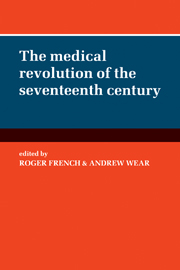Book contents
- Frontmatter
- Contents
- List of contributors
- Acknowledgements
- Introduction
- 1 Medicine, religion and the puritan revolution
- 2 Harvey in Holland: circulation and the Calvinists
- 3 The matter of souls: medical theory and theology in seventeenth-century England
- 4 Mental illness, magical medicine and the Devil in northern England, 1650–1700
- 5 Passions and the ghost in the machine: or what not to ask about science in seventeenth- and eighteenth-century Germany
- 6 Thomas Sydenham: epidemics, experiment and the ‘Good Old Cause’
- 7 The medico-religious universe of an early eighteenth-century Parisian doctor: the case of Philippe Hecquet
- 8 Isaac Newton, George Cheyne and the Principia Medicinae
- 9 Physicians and the new philosophy: Henry Stubbe and the virtuosi-physicians
- 10 The early Royal Society and the spread of medical knowledge
- 11 Medical practice in late seventeenth-and early eighteenth-century England: continuity and union
- Index
3 - The matter of souls: medical theory and theology in seventeenth-century England
Published online by Cambridge University Press: 05 January 2012
- Frontmatter
- Contents
- List of contributors
- Acknowledgements
- Introduction
- 1 Medicine, religion and the puritan revolution
- 2 Harvey in Holland: circulation and the Calvinists
- 3 The matter of souls: medical theory and theology in seventeenth-century England
- 4 Mental illness, magical medicine and the Devil in northern England, 1650–1700
- 5 Passions and the ghost in the machine: or what not to ask about science in seventeenth- and eighteenth-century Germany
- 6 Thomas Sydenham: epidemics, experiment and the ‘Good Old Cause’
- 7 The medico-religious universe of an early eighteenth-century Parisian doctor: the case of Philippe Hecquet
- 8 Isaac Newton, George Cheyne and the Principia Medicinae
- 9 Physicians and the new philosophy: Henry Stubbe and the virtuosi-physicians
- 10 The early Royal Society and the spread of medical knowledge
- 11 Medical practice in late seventeenth-and early eighteenth-century England: continuity and union
- Index
Summary
Heterodoxy is as old as Christianity itself but irreligion was perceived as something new in the intellectual life of early modern Europe. Atheism was widely seen as a progeny of the crisis of faith engendered by the changes of the renaissance and the reformation. New discoveries in philosophy, as John Donne said, called ‘all in doubt’, and religious relativism – stemming from an increased awareness of alternative religions in other parts of the world and in the multiplicity of reformed churches – made it easier to deny the absolute truth of any religious claims. Among the remedies which were prescribed for this ‘very plague and pest of humane Polities’ was a new emphasis on socalled ‘natural theology’. It was assumed that even if the atheist remained recalcitrant before Scripture, he could not hold out against ‘right reason’ and the ‘light of nature’. Natural theology was developed, therefore, in order to prove the existence and attributes of God and the immortality of human souls by recourse only to reason and the phenomena of the creation. Proofs of the immortality of the soul were held to be crucially important elements in this natural theology since the fear of post-mortem punishments was regarded as the only guarantee of morality and, therefore, of social and political stability.
The traditional pneumatology of the Roman Catholic Church and, for that matter, the major reformed churches was, of course, dualistic: body and soul were regarded as categorically distinct entities, one being material, the other immaterial.
- Type
- Chapter
- Information
- The Medical Revolution of the Seventeenth Century , pp. 87 - 113Publisher: Cambridge University PressPrint publication year: 1989
- 41
- Cited by



